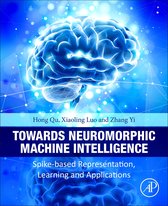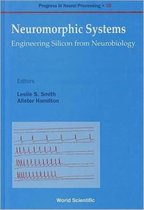Neuro-Fuzzy Architectures and Hybrid Learning
Afbeeldingen
Sla de afbeeldingen overArtikel vergelijken
Auteur:
Danuta Rutkowska
- Engels
- Hardcover
- 9783790814385
- 14 december 2001
- 308 pagina's
Samenvatting
But today, and to an increasing extent, scientific progress is being driven by a quest for machine intelligence - for systems which possess a high MIQ (Machine IQ) and can perform a wide variety of physical and mental tasks with minimal human intervention.
The main idea of this book is to present novel connectionist architectures of neuro-fuzzy systems, especially those based on the logical approach to fuzzy inference. In addition, hybrid learning methods are proposed to train the networks. The neuro-fuzzy architectures plus hybrid learning are considered as intelligent systems within the framework of computational and artificial intelligence. The book also provides an overview of fuzzy sets and systems, neural networks, learning algorithms (including genetic algorithms and clustering methods), as well as expert systems and perception-based systems which incorporates computing with words.
The advent of the computer age has set in motion a profound shift in our perception of science -its structure, its aims and its evolution. Traditionally, the principal domains of science were, and are, considered to be mathe matics, physics, chemistry, biology, astronomy and related disciplines. But today, and to an increasing extent, scientific progress is being driven by a quest for machine intelligence - for systems which possess a high MIQ (Machine IQ) and can perform a wide variety of physical and mental tasks with minimal human intervention. The role model for intelligent systems is the human mind. The influ ence of the human mind as a role model is clearly visible in the methodolo gies which have emerged, mainly during the past two decades, for the con ception, design and utilization of intelligent systems. At the center of these methodologies are fuzzy logic (FL); neurocomputing (NC); evolutionary computing (EC); probabilistic computing (PC); chaotic computing (CC); and machine learning (ML). Collectively, these methodologies constitute what is called soft computing (SC). In this perspective, soft computing is basically a coalition of methodologies which collectively provide a body of concepts and techniques for automation of reasoning and decision-making in an environment of imprecision, uncertainty and partial truth.
The main idea of this book is to present novel connectionist architectures of neuro-fuzzy systems, especially those based on the logical approach to fuzzy inference. In addition, hybrid learning methods are proposed to train the networks. The neuro-fuzzy architectures plus hybrid learning are considered as intelligent systems within the framework of computational and artificial intelligence. The book also provides an overview of fuzzy sets and systems, neural networks, learning algorithms (including genetic algorithms and clustering methods), as well as expert systems and perception-based systems which incorporates computing with words.
The advent of the computer age has set in motion a profound shift in our perception of science -its structure, its aims and its evolution. Traditionally, the principal domains of science were, and are, considered to be mathe matics, physics, chemistry, biology, astronomy and related disciplines. But today, and to an increasing extent, scientific progress is being driven by a quest for machine intelligence - for systems which possess a high MIQ (Machine IQ) and can perform a wide variety of physical and mental tasks with minimal human intervention. The role model for intelligent systems is the human mind. The influ ence of the human mind as a role model is clearly visible in the methodolo gies which have emerged, mainly during the past two decades, for the con ception, design and utilization of intelligent systems. At the center of these methodologies are fuzzy logic (FL); neurocomputing (NC); evolutionary computing (EC); probabilistic computing (PC); chaotic computing (CC); and machine learning (ML). Collectively, these methodologies constitute what is called soft computing (SC). In this perspective, soft computing is basically a coalition of methodologies which collectively provide a body of concepts and techniques for automation of reasoning and decision-making in an environment of imprecision, uncertainty and partial truth.
Productspecificaties
Wij vonden geen specificaties voor jouw zoekopdracht '{SEARCH}'.
Inhoud
- Taal
- en
- Bindwijze
- Hardcover
- Oorspronkelijke releasedatum
- 14 december 2001
- Aantal pagina's
- 308
- Illustraties
- Nee
Betrokkenen
- Hoofdauteur
- Danuta Rutkowska
- Hoofduitgeverij
- Physica-Verlag GmbH & Co
Overige kenmerken
- Editie
- 2002
- Extra groot lettertype
- Nee
- Product breedte
- 155 mm
- Product lengte
- 235 mm
- Studieboek
- Ja
- Verpakking breedte
- 164 mm
- Verpakking hoogte
- 25 mm
- Verpakking lengte
- 241 mm
- Verpakkingsgewicht
- 593 g
EAN
- EAN
- 9783790814385
Je vindt dit artikel in
- Categorieën
- Beschikbaarheid
- Leverbaar
- Taal
- Engels
- Boek, ebook of luisterboek?
- Boek
- Studieboek of algemeen
- Algemene boeken
Kies gewenste uitvoering
Bindwijze
: Hardcover
Prijsinformatie en bestellen
De prijs van dit product is 95 euro en 10 cent. Dit is een tweedehands product.Alleen tweedehands
Als nieuw
1 - 2 weken
Verkoop door
Bogamo 1 - Boeken outlet
- Bestellen en betalen via bol
- Prijs inclusief verzendkosten, verstuurd door Bogamo 1 - Boeken outlet
- 30 dagen bedenktijd en gratis retourneren
Rapporteer dit artikel
Je wilt melding doen van illegale inhoud over dit artikel:
- Ik wil melding doen als klant
- Ik wil melding doen als autoriteit of trusted flagger
- Ik wil melding doen als partner
- Ik wil melding doen als merkhouder
Geen klant, autoriteit, trusted flagger, merkhouder of partner? Gebruik dan onderstaande link om melding te doen.








